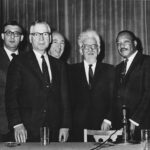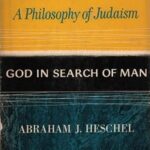Dr. Benjamin Sommer
The idea of revelation as a partnership to which both God and the people Israel make a contribution is at the core of Heschel's theology.
The Jewish Theological Seminary
New York, New York
A Jewish Perspective
Where did you first encounter Heschel’s work?
I first encountered Professor Heschel as a Prozdornik (a student at Prozdor, the Jewish supplemental program for teens) at JTS during high school. At one of our Shabbatons, Professor Reuven Kimelman taught about him, and we were all given a short biography by Byron Sherwin that introduced us to his life and thought.
How did Heschel and his thinking inspire your work, religious life, or civic engagement?
Although I am primarily a biblical scholar, my most recent book, Revelation & Authority: Sinai in Jewish Scripture and Tradition (Yale, 2015; Hebrew edition: Carmel, 2022), is as much about Heschel as it is about the Bible. I attempt to show there that Heschel’s view of revelation (and also that of Franz Rosenzweig) is much more deeply rooted in the Bible than people realize, especially in the Pentateuch’s Priestly and Elohistic strands. The idea of revelation as a partnership to which both God and the people Israel make a contribution is at the core of Heschel's kabbalistic-Hasidic theology. The Priestly and Elohistic strands of the Pentateuch, each in its own way, also describe the law-giving at Sinai as the result of a dialogue between God and Israel.
What of Heschel lives in you?
Much of Heschel’s work, from his first book (in German) through his last (in Yiddish), consists of a deeply respectful but vigorous argument with Maimonides about the true nature of God. In this debate, Maimonides is the theological radical, and Professor Heschel comes to defend traditional rabbinic and biblical understandings of a personal God who enters into relationship with human beings. My second book, The Bodies of God and the World of Ancient Israel, shows how this fundamental debate about God already occurs within the Bible itself. While writing that book, I thought of the debate as a medieval one that took place between rationalists and Kabbalists, and I tried to show that a similar or predecessor discussion about God took place in the Bible. But looking back on it, I see now that without fully realizing it, I was deeply influenced by Heschel as I wrote that book. In fact that book is no less about Heschel than my third book. This is the deepest sort of influence, the influence that is so ever-present that one ceases to be aware of it. I should add that this side of Heschel—the traditionalist who defends rabbinic and biblical Judaism against theological radicals like Maimonides—is not acknowledged as much as it should be, so I am glad that in my work and my teaching I have opportunities to show how productive and sensitive his commitment to tradition is.


